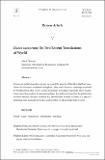Files in this item
Duces caecorum : on two recent translations of Wyclif
Item metadata
| dc.contributor.author | Thakkar, Mark | |
| dc.date.accessioned | 2020-11-10T09:30:13Z | |
| dc.date.available | 2020-11-10T09:30:13Z | |
| dc.date.issued | 2020-10-22 | |
| dc.identifier | 271158831 | |
| dc.identifier | c70c439f-c25e-4ca8-89eb-de803bed4edd | |
| dc.identifier | 000589851400010 | |
| dc.identifier.citation | Thakkar , M 2020 , ' Duces caecorum : on two recent translations of Wyclif ' , Vivarium , vol. 58 , no. 4 , pp. 357-383 . https://doi.org/10.1163/15685349-12341391 | en |
| dc.identifier.issn | 0042-7543 | |
| dc.identifier.uri | https://hdl.handle.net/10023/20939 | |
| dc.description.abstract | Two recent publications have greatly increased the amount of Wyclif available in translation: the Trialogus, translated by Stephen Lahey, and a thematic anthology translated by Stephen Penn. This review article documents the failings that make these translations worse than useless. A post mortem leads the author to claim that the publication of these volumes, the first of which has already been warmly received, is a sign of a gathering crisis in medieval studies, and one that we should take steps to avert. | |
| dc.format.extent | 611031 | |
| dc.language.iso | eng | |
| dc.relation.ispartof | Vivarium | en |
| dc.subject | John Wyclif | en |
| dc.subject | Latin language | en |
| dc.subject | Latin literature | en |
| dc.subject | Scholarship of teaching and learning | en |
| dc.subject | Translation | en |
| dc.subject | P Language and Literature | en |
| dc.subject.lcc | P | en |
| dc.title | Duces caecorum : on two recent translations of Wyclif | en |
| dc.type | Journal item | en |
| dc.contributor.institution | University of St Andrews. School of History | en |
| dc.identifier.doi | 10.1163/15685349-12341391 | |
| dc.description.status | Peer reviewed | en |
This item appears in the following Collection(s)
Items in the St Andrews Research Repository are protected by copyright, with all rights reserved, unless otherwise indicated.

